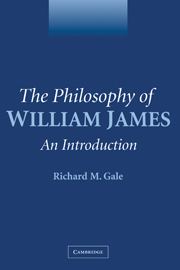Introduction
Published online by Cambridge University Press: 06 January 2010
Summary
William James (1842–1910) had a peripatetic childhood in which his father, the theologian Henry James, Sr., hustled him and his four younger siblings, among whom was the novelist Henry James, Jr., from one European nation to another in search of an adequate education. After a brief stint as a painting student of William Morris Hunt he entered the Lawrence Scientific School at Harvard in 1861. Upon graduation in 1864 he enrolled in the Harvard Medical School, completing the M.D. degree in 1869, with a year off to participate in Louis Agassiz's research expedition to Brazil. After suffering serious ill health and depression from 1869 to 1872, he became an instructor in physiology at Harvard, where he spent his entire career until his retirement in 1907. He rapidly moved up the academic ladder, becoming instructor in anatomy and physiology in 1873, assistant professor of physiology in 1876, assistant professor of philosophy in 1880, full professor in 1885, and professor of psychology in 1889.
The best way to characterize James's philosophy is that it is a passionate quest to have it all, to grab with all the gusto he can, which, for James, means achieving the maximum richness of experience. This requires having each of his many selves, which includes the scientist, moralist, and mystic, fully realize itself. Unfortunately, this grand quest is thwarted by the apparent tensions and conflicts between the perspectives of these different selves.
- Type
- Chapter
- Information
- The Philosophy of William JamesAn Introduction, pp. 1 - 12Publisher: Cambridge University PressPrint publication year: 2004
- 1
- Cited by

